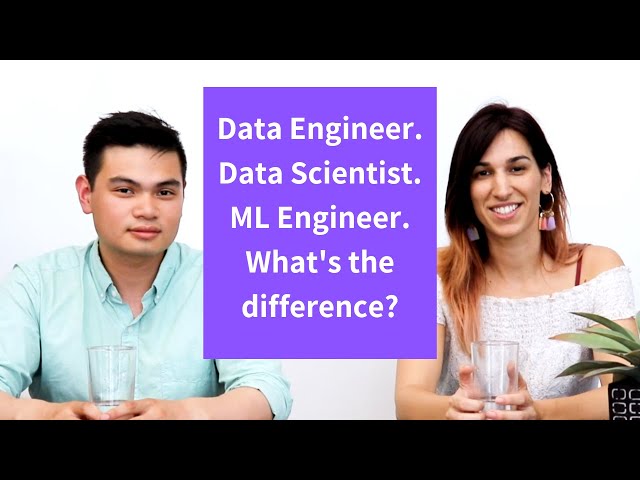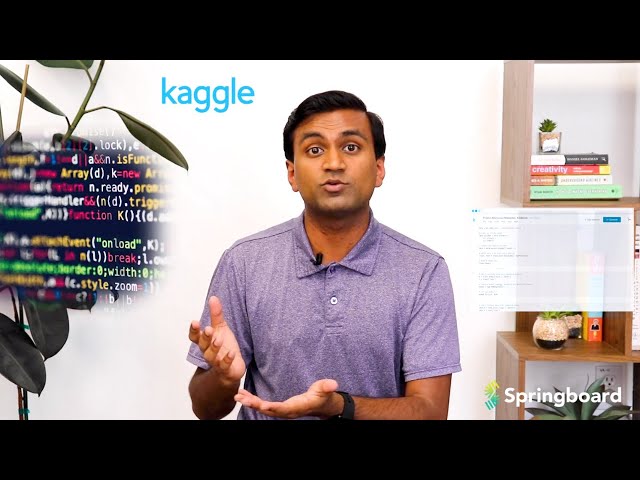10 Best Data Engineering Courses to Grow Your Skills

In this article
Nowadays, data engineering roles often fetch six-figure salaries. With companies and organizations realizing how instrumental data can be to their business, data engineers are in huge demand.
Regardless of your background knowledge related to this field, you too can be a part of this growing clan of data experts. And if you’re looking to join this exciting subset of data science, but don’t know where to start, then this guide is for you. Below, we’ll tell you all about the 10 best data engineering courses, and what makes them great.
What Is Data Engineering?
Data engineering is the process of data collection, storage, and analysis. A data engineer builds the necessary data infrastructure for data scientists and data analysts to work with data. The main goal of data engineering is to make data digestible and accessible for the other teams.
10 Best Data Engineering Courses
Here’s our list of the ten best data engineering courses.
| Company | Course | Rank | Price | Details |
|---|---|---|---|---|
 |
Springboard Data Science Career Track | 4.64 | $9,900 | Learn More |
 |
Professional Certificate in Data Engineering | N/A | $1,076.40 | Learn More |
 |
Preparing for Google Cloud Certification: Cloud Data Engineer Professional Certificate | 4.6 | $49 | Learn More |
 |
Data Engineer with Python | 4.25 | $149 | Learn More |
 |
Data Engineer Career Path | 4.6 | $33.25 | Learn More |
 |
Data Engineering with AWS | 4.65 | $399 | Learn More |
 |
Data Engineering Zoomcamp | N/A | N/A | Learn More |
 |
Data Warehouse Fundamentals for Beginners | 4.5 | $44.99 | Learn More |
 |
Taming Big Data with Apache Spark and Python – Hands On! | 4.6 | $24.99 | Learn More |
 |
Introduction to Designing Data Lakes on AWS | 4.6 | $49 | Learn More |
Springboard Data Science Career Track
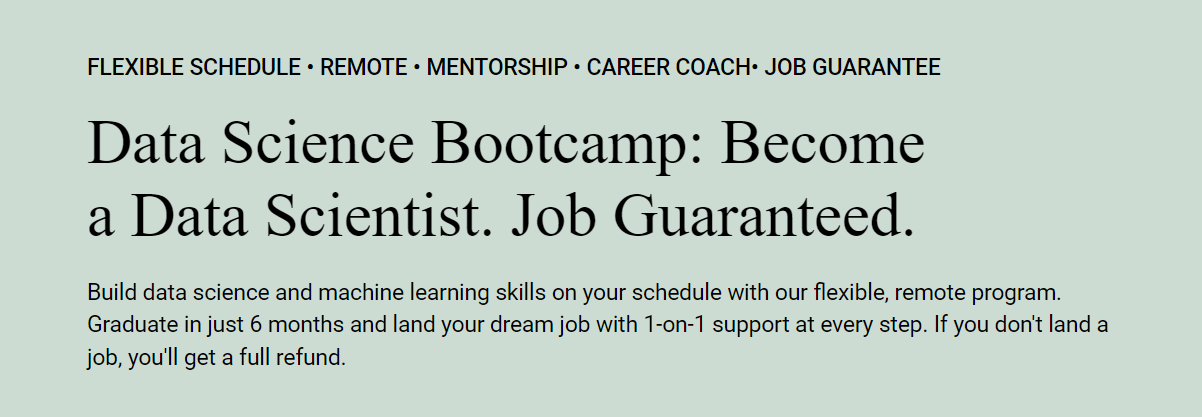
Rating
Average: 4.64
Overview
The Springboard Data Science Bootcamp is a self-paced online program that combines theoretical learning and hands-on experience. This career track course has 14 mini-projects, 1:1 support from industry experts, and personalized career coaching. It’s an ideal program for anyone looking to make a swift transition into the data engineering ecosystem. Springboard offers a 6-month job guarantee, which means you get a full refund if you don’t land a data science job six months after graduating from the bootcamp.
Best For
Those with prior coding experience and familiarity with probability and descriptive statistics. If you don’t match these prerequisites, you can take the core beginner (free) course to establish the basics. This course is suitable for those wanting to build a portfolio to show to hiring managers and those who require assistance with resume drafting and LinkedIn profile optimization.
Duration
Six months
Get To Know Other Data Science Students
Leoman Momoh
Senior Data Engineer at Enterprise Products
George Mendoza
Lead Solutions Manager at Hypergiant
Sam Fisher
Data Science Engineer at Stratyfy
Prices Starting From
$9,900. However, Springboard has many flexible pricing options, including a money-back guarantee if you don’t land a job soon after graduation.
IBM Data Engineering Professional Certificate
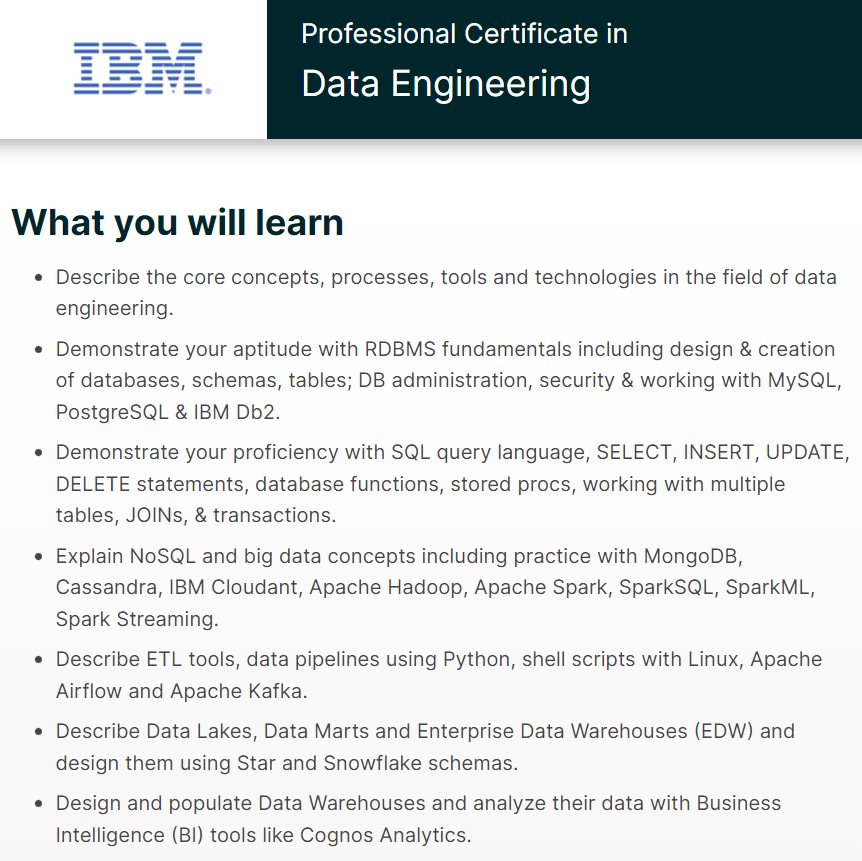
Rating
Not available
Overview
This certificate program by IBM covers the core data engineering concepts, including the basics of Python and SQL(structured query language), a programming language used to access databases. With 14 self-paced courses, you’ll get the opportunity to complete real-world projects through lab simulations. You’ll also work with Python libraries, Bash, Apache Spart, ETL tools, and Relational Database Management Systems.
Best For
Those with no programming or data engineering background knowledge since this course starts with the fundamentals. It is also a great way to learn from IBM experts themselves.
Duration
One year, with a recommended weekly timely investment of 3-4 hours
Prices Starting From
$1,076.40
Coursera Google Cloud Data Engineer Professional Certificate

Rating
4.6 (based on 6,389 ratings on the course website)
Overview

This certificate program by Google Cloud covers the scope of big data and machine learning on the Google Cloud platform. Big data projects and concepts are also a part of this course. Through this course, you’ll learn how to use Cloud SQL and data processing products by Google. You’ll also learn about the role of data engineers, and how to perform data migration.
Best For
Those with some background in SQL, and who are also familiar with the basics of machine learning and Python, as this course covers data engineering topics only in the context of Google Cloud. This is ideal if you want to show Google Cloud on your resume because the sixth course helps you pass the Google Cloud Professional Data Engineer exam. If your goal is to build scalable applications on Google Cloud or have a machine learning resume, this course can help.
Duration
3.5 months, at the suggested time investment of five hours per week.
Prices Starting From
$49/month after a 7-day free trial.
DataCamp’s Data Engineer with Python Career Track
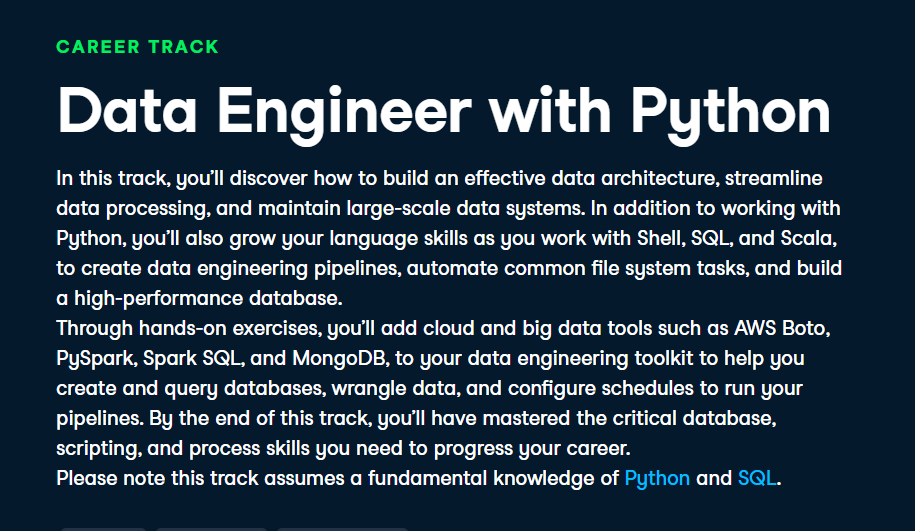
Rating
Average: 4.25
Overview
This bundle of 19 courses from DataCamp covers the basics of data architecture, data processing, and data systems. You will learn advanced Python, SQL, Scala, and Shell concepts. The course combines theoretical knowledge with hands-on projects so that you can try to wrangle data and create databases.
The course instructors are an eclectic selection of data scientists, advanced data engineers, developers, and educators. It tracks your progress like a game in the form of XP points, hints, and pop quizzes.
Best For
Those who have some knowledge of Python and SQL but are not necessarily familiar with data engineering. Beginners can take a few basic SQL and Python courses before taking up this one.
Duration
73 hours
Prices Starting From
$149
Dataquest’s Data Engineer Career Track

Rating
Average: 4.60
Overview
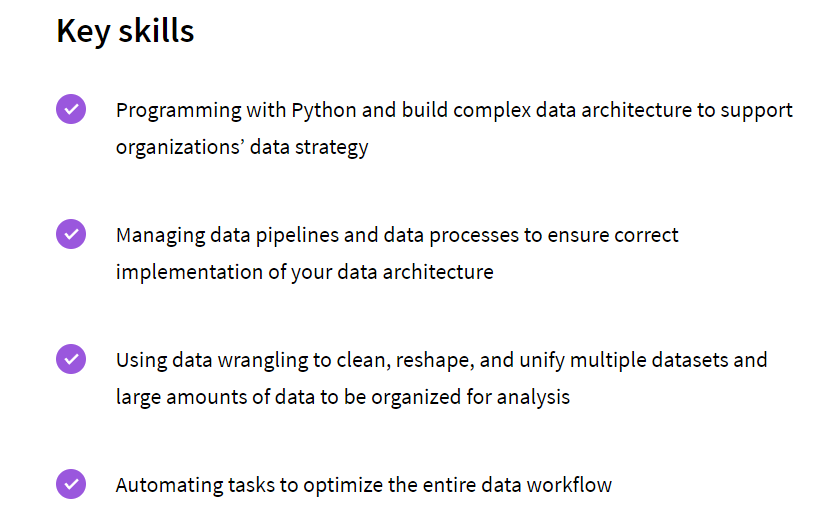
This bundle of 19 courses from Dataquest is a beginner-to-advanced course that covers everything you need to land a job as an entry-level job as data engineer. You’ll complete 16 projects over the duration of the course. The initial projects help you reiterate the basics, while the advanced projects give you a chance to experience the kind of tasks you will deal with as a data engineer. You get feedback as you go, and by the end of each of these career paths in the course, you should be able to automate and manage data workflows. Dataquest offers a refund if you are not satisfied with the course.
Best For
Beginners who want a comprehensive source of knowledge from start to end in the data engineering field. The courses come with an in-built coding platform, so it’s ideal for those who want to play around and practice their basic skills related to coding without downloading additional software and tools.
Duration
Five months, with a suggested studying time of 10 hours a week.
Prices Starting From
$33.25/month
Udacity Data Engineer Nanodegree

Rating
Average: 4.56
Overview

This online program covers advanced perspectives on data models, data warehouses, and data lakes. You will learn how to automate data pipelines and wrangle data from large databases, and how to work with Amazon Web Services (AWS). The curriculum also teaches you how to work with tools like Postgre SQL and Apache, Spark, and others. At the end of the course, you’ll complete a capstone data engineering project of your choice. The Udacity Data Engineer community also offers you support in the form of LinkedIn profile guidance and data engineering portfolio assistance to ensure a bright career. You also get access to a student community to help with doubts and clarifications.
Best For
Those with knowledge of Python and SQL, are either looking to upskill or laterally transition from other data-based roles.
Duration
Five months if you study for 5-10 hours a week
Prices Starting From
$399/month
Data Engineering Zoomcamp

Rating
N/A
Overview
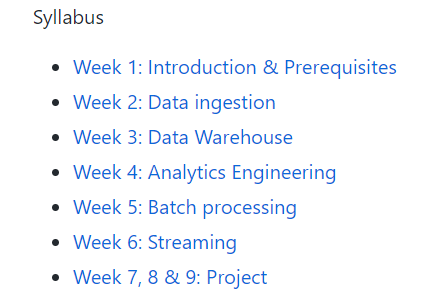
This data engineering camp is hosted by DataTalks, a global community of data experts and enthusiasts. It’s a self-paced course that covers the fundamental concepts of data engineering. The course creators have combined the powers of Slack, Telegram, and YouTube to give their students a feeling of community, continuous support, and free resources. Through the weeks, you will learn how to use various tools like Docker, Airflow, Spark, and the Google Cloud Platform. In the final three weeks, you will get the chance to work on a project and have it peer-reviewed.
Best For
Those who already understand the basics of Python and SQL. From week one, the course starts with complicated topics like Google Cloud Platform, data ingestion, batch and stream processing, and analytics engineering. Therefore, knowing how to code will help you immensely with keeping up. Since this course is free and self-paced, it can be a tremendous parallel source of learning while you upskill with more intensive courses.
Duration
Nine weeks
Prices Starting From
Free
Data Warehouse Fundamentals for Beginners

Rating
4.5 (based on 15,973 ratings on the course website)
Overview

By the end of this course, you’ll be able to build a robust data warehouse using a variety of models and approaches. You’ll first learn about data warehousing fundamentals, best practices for sketching data architecture, and how to reconcile data warehousing needs with business goals. You’ll then learn about fact tables, which are measurements or facts related to the business, such as costs and revenue. By the end of the course, you will know how to build dimensional models using fact tables.
Best For
Those with a basic understanding of SQL and the ability to create data structures can benefit most from this course. It is ideal for those who want to familiarize themselves with data warehousing. Successful data engineers or designers who want to transition to warehousing architect roles, warehousing business analyst positions, or ETL designer roles will find this brief course useful.
Duration
5 hours
Prices Starting From
$44.99
Taming Big Data with Apache Spark and Python
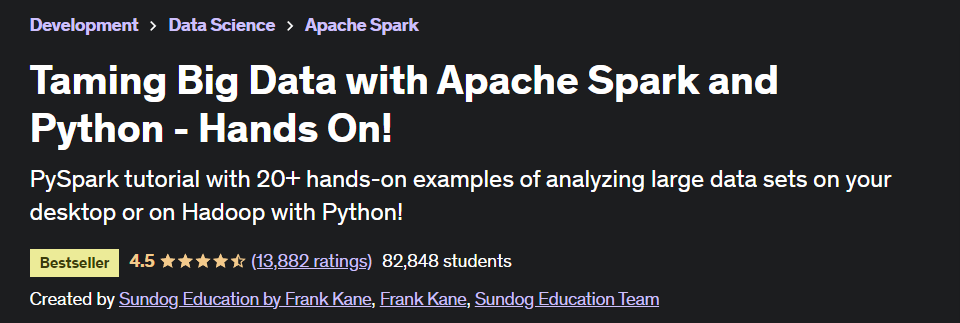
Rating
4.6 (based on 13,758 ratings on the course website)
Overview
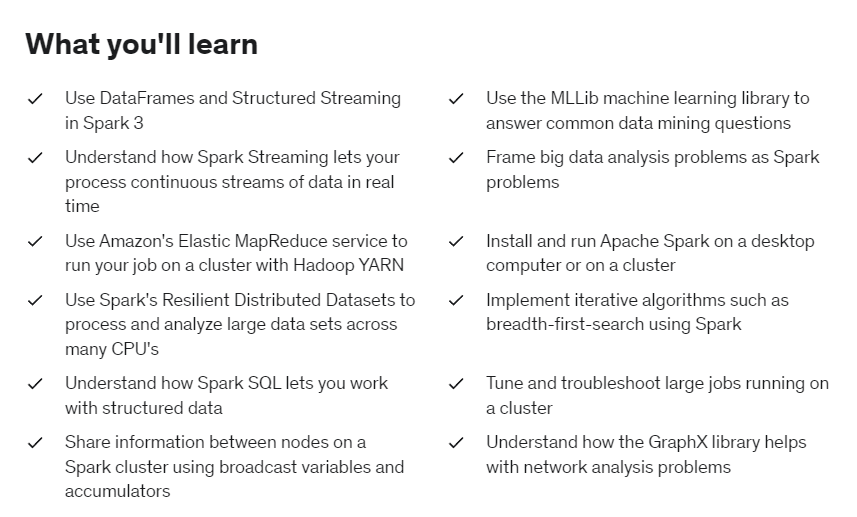
This course focuses on SparkSQL, and will teach you how to work with structured data and large databases using data frames. It also covers machine learning concepts and data analysis related to Spark. Some of the course’s hands-on projects include:
- Finding minimum temperatures, total spends by a customer, and word count exercises using DataFrames
- Finding obscure and famous superheroes, similar movie scripts, and popular movies using Spark
- Producing movie recommendations, predicting real estate prices, and analyzing ALS recommendations using Spark ML
Best For
This course is designed for those who are preparing for a job that requires Spark. This course is also a good fit for those with a software development background knowledge and programming experience.
Duration
7 hours of content
Prices Starting From
$24.99
Introduction to Designing Data Lakes in AWS (Amazon)

Rating
4.6 (based on 115 ratings on the course website)
Overview
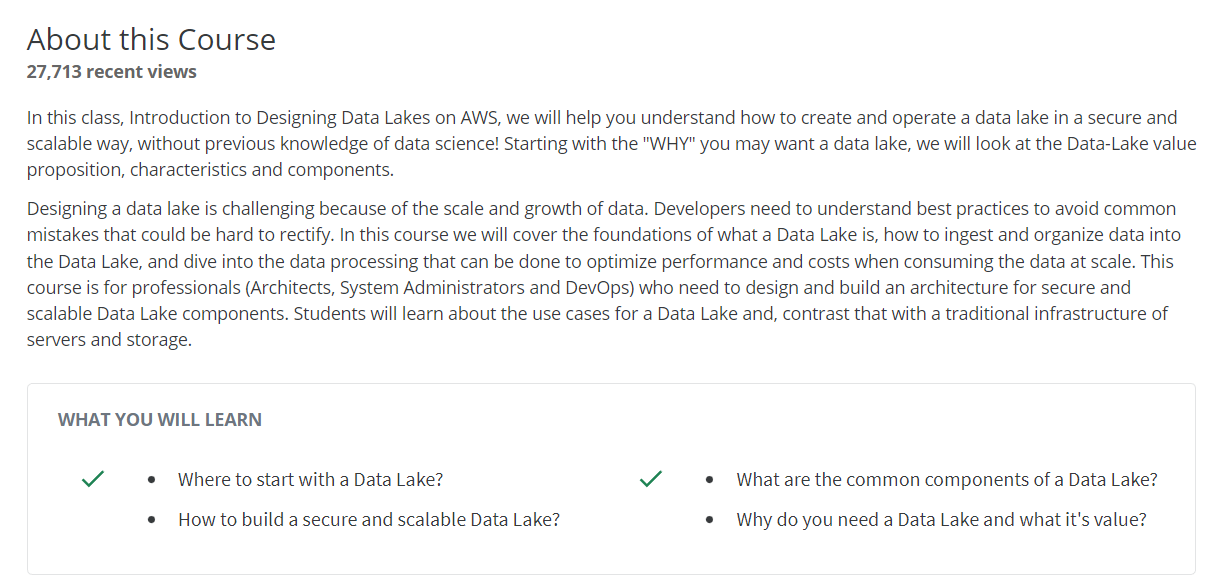
This course focuses on one specific aspect of data engineering: data lakes. A data lake is a storage space for all your unstructured, semi-structured, or fully structured data. You will learn how to build secure data lakes on a large scale using Amazon Web Services. By the end of the course, you should be able to differentiate between a data lake and a data warehouse and how AWS can be used for data processing, analytics, and data cataloging. The course covers batch data ingestion, data streaming, glue crawlers, and other core concepts relevant to data lakes. In the final week, you will learn about data lake security, AWS datasets, and how to analyze datasets.
Here is a list of the 12 best data warehousing courses to help you advance your skills.
Best For
Those who work in the data security space and want to familiarize themselves with data lakes as a peripheral part of their job. These could be architects, system administrators, and professionals specializing in DevOps.
Duration
13 hours, divided over four weeks
Prices Starting From
$49
How Do You Choose a Data Engineering Course?

Consider these facets of a data engineering course to choose the one that’s right for you:
Syllabus
Data engineering is a vast field, and no single course will cover everything you need to know. Go through the syllabus of the courses we listed to check whether there is an appropriate mix of theory and hands-on training or application-based components. This online training could be in the form of topic-wise application-based hands-on exercises, hands-on labs, or capstone projects with real-world relevance. If you have already identified a subfield of data engineering that you are interested in, ensure that the course you pick primarily focuses on this with sufficient hands-on practice. If you are a beginner, go for an introductory course that covers fundamental knowledge instead of looking for a more specific focus.
Career Enlightenment
This can mean different things for different individuals, depending on their goals. If career enlightenment means finding a stable 9-5 job with job security, then go for a data engineering course that kickstarts career opportunities and learning with this goal in mind. Providing career enlightenment in this context could mean providing placement support in the top companies for data engineering. If your goal is to become a freelance data engineer, you are better off picking a course that is tilted towards unconventional job opportunities. If career enlightenment means having a solid network to support your career paths, choose a course with seminars or some interaction with industry experts throughout its duration. You can achieve career enlightenment with any detailed course!
Instructor Credibility
Checking just the syllabus is not enough. Go through the instructor profiles to understand their background. Check their Linkedin to know more about them. Have they worked at your dream company? Do they have hands-on experience with online teaching? If possible, go through some of their videos to gauge whether you would feel engaged while they speak.
Pricing & Payment Options
Investing in a course can feel like a huge commitment because it often is. Most courses we listed have flexible payment options, such as deferred payments, upfront payments with a significant discount, or installment payments. You can also pick a course that provides refund options if you don’t land a job within a specific time. Course platforms with flexible pricing and payment options, no matter how expensive the course is, will often be able to support you with the financial aspect of the process.
Schedule
How many hours does the course recommend you spend per week on readings? If you are already pursuing a full-time job or a degree, do you have time on weekends to squeeze in all the hours? If you have the time, does the course duration fit within your timeline of goals? Are the classes pre-recorded (which provides more flexibility) or live? Ask yourself these questions to help you decide.
Reviews & Ratings
Reviews can help you understand a course’s ratings. Check forums like Reddit, which have communities for data engineering to understand individual perspectives on a course. You must also check the ratings of the instructors. Talk to those who have completed a course about their experience with the teaching style, feedback mechanisms, and course content. The more you know about a course, the closer your experience will be to your expectations.
Making the Most Out of Your Data Engineering Course

Ask yourself these questions to make the most of your data engineering course:
How Do Data Engineering Courses Work?
The best data engineering courses offer consistent feedback and support. This could be in the form of career guidance, wherein you get interview prep and resume drafting assistance. This can also happen through project-oriented teaching, which will help you build your portfolio. A good data engineering course will prepare you to experiment with different career paths.
What Should You Expect to Learn From the Course?
The syllabus of the particular course will give you the most precise answer. You can expect to learn concepts from the following broad topics:
- Data Warehouse
- Big Data Modeling, a niche of a big data engineer
- Machine learning models
- Data pipelines
- Analytics models
- Database management
You will learn the fundamentals of these concepts, how these focus areas connect, and the latest trends in these sub-niches. Depending on the course, you will have the opportunity to translate your conceptual knowledge of these topics into hands-on projects.
You should also expect to tap into career opportunities and learning options relevant to your goals through your chosen course.
What Will Your Schedule Look Like?
With flexible deadlines, most part-time courses expect you to commit about 10-20 hours per week. A full-time course could be more intensive, with live classes and static deadlines. As you comb through the duration details of each course, chart out a timetable for yourself so that you can carve out time for the one you pick. Self-paced online courses will provide the most flexible schedules.
FAQs About Data Engineering Courses
We’ve got the answers to your most frequently asked questions:
What Prerequisites Are Needed for a Data Engineering Course?
Introductory courses will have no prerequisites at all, apart from perhaps having a system at your disposal with a stable Internet connection. The more advanced courses will expect you to have some pre-existing industry knowledge or in-depth knowledge related to some topics, such as programming experience, and familiarity with SQL or specific data engineering tools. These courses are meant for those who want to upskill after already being a part of the field or are looking for particular career track guidance.
Can You Qualify for a Job by Completing Data Engineering Courses?
Yes! A good data engineering course will give you sufficient in-depth knowledge to prepare you for entry-level or mid-level positions in data engineering. You can also supplement your learning with data science certifications.
Are Data Engineering Courses Worth the Cost?
Some are. The more value-laden courses may come with a significant financial investment, but taking advantage of all the offerings within the course will justify the price. Your data engineering skills will be in huge demand in no time, and you will have a bright career ahead of you.
Since you’re here…Are you a future data scientist? Investigate with our free guide to what a data scientist actually does. When you’re ready to build a CV that will make hiring managers melt, join our Data Science Bootcamp that guarantees a job or your tuition back!
